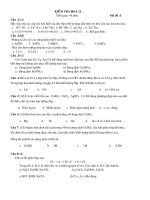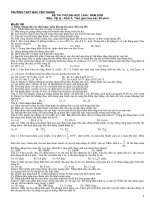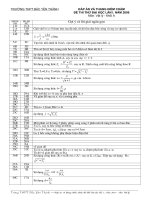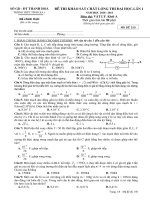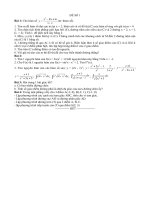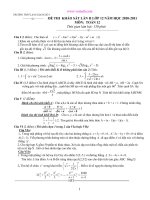đề số 1 đề thi thử THCS THPT
Bạn đang xem bản rút gọn của tài liệu. Xem và tải ngay bản đầy đủ của tài liệu tại đây (127.54 KB, 5 trang )
ĐỀ LUYỆN THI VÀO 10
NO 01
(Đề thi gồm 4 trang. Thời gian làm bài 60 phút)
Mark the letter A, B, C, or D to indicate the word whose underlined part differs from the other three in
pronunciation in each of the following questions.
Question 1.
A. artisan
B. attraction
C. lacquerware
D. craft
Question 2.
A. workshop
B. weave
C. downtown
D. win
Mark the letter A, B, C, or D to indicate the word that differs from the other three in the position of primary stress
in each of the following questions.
Question 3.
A. handicraft
B. attraction
C. numerous
D. charcoal
Question 4.
A. versatile
B. television
C. artefact
D. preserve
Mark the letter A, B, C, or D to indicate the correct answer to each of the following questions.
Question 5: The flower was………. out of a single piece of valuable wood.
A. carved
B. moulded
C. cast
D. given
Question 6: I love going to this place _____ it’s the quietest place in the city.
A. so
B. though
C. so that
D. as
Question 7: This scorts centre is so small that it cannot______the demands of local residents.
A. keep up with
B. face up to
C. deal about
D. set up
Question 8: If you like, I can_____ flowers on the cushion covers for you.
A. grow
B. make
C. embroider
D. knit
Question 9. When I turned up, the town hall was already_____ of teenagers
A. full
B. packed
C. crowded
D. jammed
Question 10. Japan is the__________ developed country in the world.
A. most second
B. second in most
C. second most
D. two most
Question 11. This city has one of the most___ underground rail networks in the world.
A. efficient
B. fashionable
C . cosmopolitan D. fascinated
Question 12. Factories and offices should be built in ……………………….. areas only.
A. rural
B. coastal
C. culture
D. urban
Question 13. Today’s cities are____than cities in previous times.
A. lots larger
B. much larger
C. as large
D. the largest
Question 14. She turned____the new job in New York because she didn’t want to move.
A. on
B. down
C. off
D. up
Question 15. Do you know who’s______ his pottery workshop?
A. bring out
B. taking over
C. passing down
D. turning down
Question 16. In this town, they_____ all the frames in steel.
A. make
B. have
C. mould
D. cast
Mark the letter A, B, C, or D to indicate the correct response to each of the following exchanges.
Question 17. Patient: "Can I make an appointment to see the doctor, please?" Receptionist: “ ____________”
A. Not at the moment. He can't be disturbed.
B. OK, you will need to check my diary.
C. OK, let me just check the diary.
D. Have a seat and I'll be with you in an hour.
Question 18. “Wow! What a nice coat you are wearing!” – “
_______________”
A. Certainly. Do you like it, too?
B. I like you to say that
C. Yes, of course. It‘s expensive
D. Thanks. My mother bought it for me.
Mark the letter A, B, C, or D to indicate the word(s) CLOSET in meaning to the underlined word(s) in each of the
following questions.
Question 19. He was asked to account for his presence at the scene of crime.
A. complain
B. exchange
C. explain
D. arrange
Question 20. Roget's Thesaurus, a collection of English words and phrases, was originally arranged by the ideas they
express rather than by alphabetical order.
A. restricted
B. as well as
C. unless
D. instead of
Mark the letter A, B, C, or D to indicate the word(s) OPPOSITE in meaning to the underlined word(s) in each of
the following questions.
Question 21. He decided not to buy the fake watch and wait until he had more money.
A. authentic
B. forger
C. faulty
D. original
Question 22. Now, when so many frogs were killed, there were more and more insects.
A. lesser and lesser
B. fewer and fewer
C. lesser and fewer
D. less and less
Mark the letter A, B, C, or D to indicate the underlined part that needs correction in each of the following
questions.
Question 23. Today (A) the number of people (B) enjoying winter sports (C) are almost double (D) that of twenty years
ago.
Question 24. Some people (A) often say that (B) using cars is not as convenient (C) than (D) using motorbikes.
Question 25. (A) Globally and internationally , the 1990's stood (B) out as the (C) warmest decade in the history of (D)
weather records.
Read the following passage and mark the letter A, B, C or D to indicate the correct word or phrase that best fits
each of the numbered blanks.
When you come to the countryside of Vietnam, especially in Hue, you can see a lot of beautiful girls with a palm leaf
(26)__________ hat on. The conical leaf hat is said the symbol of the Vietnamese (27)__________.The hat is made
(28)__________ a special kind of bamboo and young and soft palm leaves. The ribs are shaped into a conical form. The
diametre of the hat is usually about between forty and fifty-five centimetres; and it is about twenty-five or thirty
centimetres high. The ribs are covered with palm leaves which are tightly stitched onto the bamboo frame. Finally, the hat
is usually (29)__________ with a coat of furniture - polish oil.
The palm leaf conical hat is mainly used to protect from shine or rain. Beneath the broad rim of the hat do
Vietnamese girls look more (30)__________ and charming?
Question 26. A. cone
B. conical
C. conically
D. conicity
Question 27. A. culture
B. nation
C. hat
D. flag
Question 28. A. with
B. to
C. from
D. in
Question 29. A. drawn
B. written
C. painted
D. covered
Question 30. A. attract
B. attractive
C. attraction
D. attractiveness
Read the following passage and mark the letter A, B, C or D to indicate the correct answer to each of the questions.
COLORS AND EMOTIONS
Colors are one of the most exciting experiences in life. I love them, and they are just as important to me as emotions are.
Have you ever wondered how the two are so intimately related?
Color directly affects your emotions. Color both reflects the current state of your emotions, and is something that you can
use to improve or change your emotions. The color that you choose to wear either reflects your current state of being, or
reflects the color or emotion that you need.
The colors that you wear affect you much more than they affect the people around you. Of course they also affect anyone
who comes in contact with you, but you are the one saturated with the color all day! I even choose items around me based
on their color. In the morning, I choose my clothes based on the color or emotion I need for the day. So you can
consciously use color to control the emotions that you are exposed to, which can help you to feel better.
Color, sound and emotions are all vibrations. Emotions are literally energy in motion; they are meant to move and flow.
This is the reason that real feelings are the fastest way to get your energy in motion. Also, flowing energy is exactly what
creates healthy cells in your body. So, the fastest way to be healthy is to be open to your real feelings. Alternately, the
fastest way to create disease is to inhibit your emotions.
Question 31. What is the main idea of the passage?
A. Emotions and colors are closely related each other.
B. Colorful clothes can change your mood.
C. Colors are one of the most exciting experiences in life.
D. Colors can help you become more influenced.
Question 32. Which of the following can be most affected by color?
A. Your friend’s feelings.
C. Your need for thrills.
B. Your mood.
D. Your appetite.
Question 33. According to this passage, what do color, sound and emotions all have in common?
A. They are all related to health.
C. They are all forms of motions.
B. They are all vibrations.
D. They all affect the cells of the body.
Question 34. According to this passage, what creates disease?
A. Ignoring your emotions.
C. Exposing yourself to bright color.
B. Wearing the color black.
D. Being open to your emotions.
Question 35. The term “intimately” in paragraph 1 is closest in meaning to
A. clearly.
B. obviously.
C. simply.
D. closely.
Question 36. The term “they” in paragraph 3 refers to
A. people
B. colors
C. emotions
D. none of the above
Question 37. The phrase “saturated with” in paragraph 3 is closest in meaning to
A. bored with
B. in need of
C. lacking in
D. covered with
Read the following passage and mark the letter A, B, C or D to indicate the correct answer to each of the questions.
In the West, cartoons are used chiefly to make people laugh. The important feature of all these cartoons is the joke and
the element of surprise which is contained. Even though it is very funny, a good cartoon is always based on close
observation of a particular feature of life and usually has a serious purpose.
Cartoons in the West have been associated with political and social matters for many years. In wartime, for example, they
proved to be an excellent way of spreading propaganda. Nowadays cartoons are often used to make short, sharp
comments on politics and governments as well as on a variety of social matters. In this way, the modern cartoon has
become a very powerful force in influencing people in Europe and the United States.
Unlike most American and European cartoons, however, many Chinese cartoon drawings in the past have also attempted
to educate people, especially those who could not read and write. Such cartoons about the lives and sayings of great men
in China have proved extremely useful in bringing education to illiterate and semi-literate people throughout China.
Confucius, Mencius and Laozi have all appeared in very interesting stories presented in the form of cartoons. The
cartoons themselves have thus served to illustrate the teachings of the Chinese sages in a very attractive way.
In this sense, many Chinese cartoons are different from Western cartoons in so far as they do not depend chiefly on telling
jokes. Often, there is nothing to laugh at when you see Chinese cartoons. This is not their primary aim. In addition to
commenting on serious political and social matters, Chinese cartoons have aimed at spreading the traditional Chinese
thoughts and culture as widely as possible among the people.
Today, however, Chinese cartoons have an added part to play in spreading knowledge. They offer a very attractive and
useful way of reaching people throughout the world, regardless of the particular country in which they live. Thus, through
cartoons, the thoughts and teachings of the old Chinese philosophers and sages can now reach people who live in such
countries as Britain, France, America, Japan, Malaysia or Australia and who are unfamiliar with the Chinese culture.
Until recently, the transfer of knowledge and culture has been overwhelmingly from the West to the East and not vice
versa. By means of cartoons, however, publishing companies in Taiwan, Hong Kong and Singapore are now having
success in correcting this imbalance between the East and the West.
Cartoons can overcome language barriers in all foreign countries. The vast increase in the popularity of these cartoons
serves to illustrate the truth of Confucius’s famous saying “One picture is worth a thousand words.”
Question 38. Which of the following clearly characterizes Western cartoons?
A. Enjoyment, liveliness, and carefulness.
C. Humour, unexpectedness, and criticism.
B. Originality, freshness, and astonishment.
D. Seriousness, propaganda, and attractiveness.
Question 39. Chinese cartoons have been useful as an important means of
A. educating ordinary people
C. political propaganda in wartime
B. amusing people all the time
D. spreading Western ideas
Question 40. The major differences between Chinese cartoons and Western cartoons come from their
A. purposes
B. styles
C. nationalities
D. values
Question 41. The pronoun “this” in paragraph 4 mostly refers to
A. a funny element
C. an educational purpose
B. a propaganda campaign
D. a piece of art
Question 42. Which of the following could be the best title for the passage?
A. Cartoons as a Way of Educating People
C. A Very Powerful Force in Influencing People
B. An Excellent Way of Spreading Propaganda
D. Chinese Cartoons and Western Cartoons
Question 43. The word “imbalance” in paragraph 6 refers to
A. the dominant cultural influence of the West over the East
B. the discrimination between the West culture and the East culture
C. the influence of the East cartoons over the West cartoons
D. the mismatch between the East cartoons and the West cartoons
Question 44. Which of the following is most likely the traditional subject of Chinese cartoons?
A. The philosophies and sayings of ancient Chinese thinkers.
B. The illiterate and semi-literate people throughout China.
C. The stories and features of the lives of great men the world over.
D. Jokes and other kinds of humour in political and social matters.
Question 45. According to the passage, which of the following is true?
A. Western cartoons always have a serious purpose.
C. Language barriers restricted cartoons.
B. Cartoons can serve various purposes.
D. Cartoons will replace other forms of writing.
Mark the letter A, B, C or D on your answer sheet to indicate the sentence that is closest in meaning to each of the
following questions
Question 46. By modern standards, the first supermarkets were really quite small.
A. Compared with what we have now, the early supermarkets weren't actually very large at all.
B. The early supermarkets and the present-day ones are quite different from each other, even in size.
C. Present-day supermarkets are on the whole larger than the early ones.
D. Supermarkets have grown in size since they were first introduced, but their standards remain the same.
Question 47. As long as you stay calm, you have nothing to fear from the interview.
A. You have remained calm for a long time in spite of your fear of the interview.
B. Interviews are only intimidating for people who are not extremely calm.
C. Provided you do not get nervous, the interview won't go badly for you.
D. Even if you are afraid of the interview, it is important not to let it show.
Question 48. The last time I saw Peter was when I ran into him at the station on my way to Glasgow.
A. I haven't seen Peter since a chance meeting with him at the station when I was setting off for Glasgow.
B. The last time I went to Glasgow, I happened to meet Peter at the station.
C. When I last saw Peter at the station when I was on my way to Glasgow, I ran after him.
D. I finally saw Peter at the station when I was on my way to Glasgow.
Mark the letter A, B, C or D on your answer sheet to indicate the sentence that best combines each pair of
sentences in the following questions.
Question 49. It’s not fair to put all the blame on him. He’s not the only one at fault.
A. He doesn't deserve to be blamed for everything as there were others involved.
B. He deserved to be punished, but the others don’t.
C. It wouldn't be right to punish those who, like him, were not involved.
D. Only the one who were involved should be punished.
Question 50. You will have to tell him about it in the end. The longer you put off doing so, the harder it’s going to be.
A. You can never keep things secret for long, so the best is to tell him about it soon.
B. Surely it’s better to let him know about it now than wait until he finds out for himself.
C. He will have to be notified about it, and the sooner the better.
D. You can’t keep him in the dark about it forever, and telling him will get harder the longer you wait.
